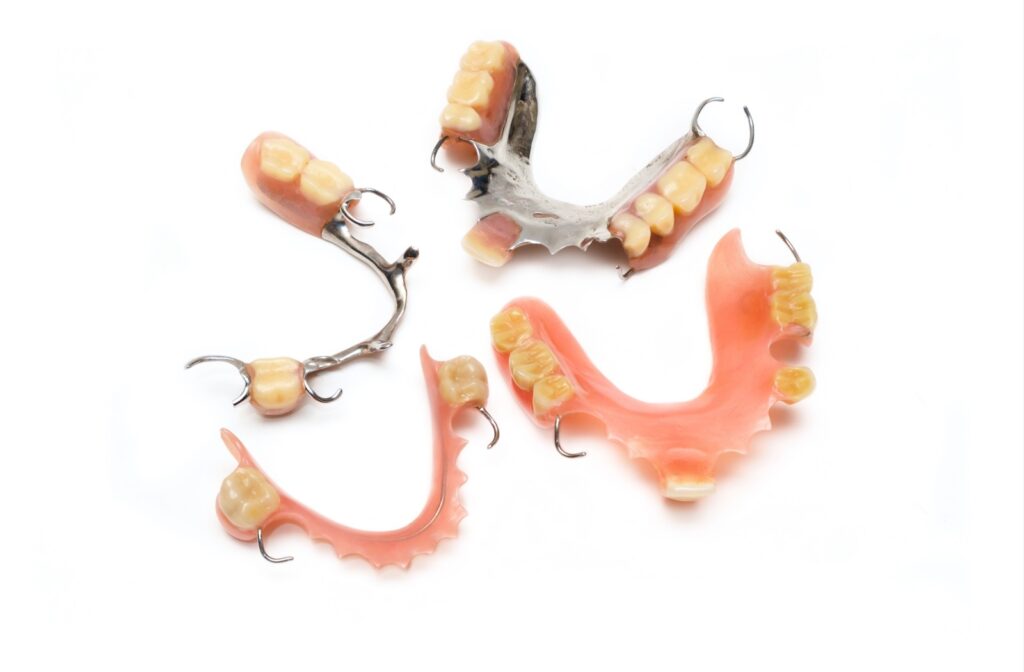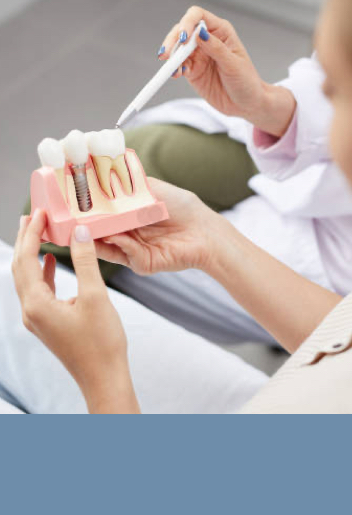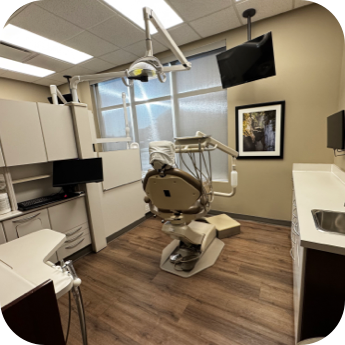Believe it or not, missing teeth can affect more than just your appearance—they can impact your dental health, ability to chew, and even your speech. Whether your missing teeth are due to decay or an accident, the good news is you have plenty of options when it comes to restoring your smile.
Two popular solutions to missing teeth are dental implants and dentures. But how can you tell which one is right for you? The choice between implants and dentures comes down to which teeth are missing, your lifestyle, and which of the two your jaw is able to support. Remember that you don’t have to make this decision alone: your dentist can help you weigh the pros and cons.
What Are Dental Implants?
Dental implants are artificial tooth roots, typically made of titanium, that an oral surgeon surgically plants into your jawbone. These implants serve as a sturdy base for attaching permanent or removable replacement teeth, both of which are custom-made to match your natural teeth.
The process of getting dental implants begins with a thorough consultation, where your dentist evaluates your overall oral health to determine if you’re a good candidate for the procedure. This evaluation may include both X-rays as well as a detailed examination of your gums and jawbone in order to ensure there is sufficient bone structure to support the implant.
After placement of the implant, you’ll need to allow the area to heal for up to several months, during which time the bone gradually grows around the implant, securing it firmly in place—a process known as osseointegration. This critical phase ensures that the implant integrates well with your natural bone, providing a stable foundation for new teeth.
After this healing period, your dentist attaches an abutment to the implant post. The abutment serves as the connector between the implant and the crown. Finally, you’ll receive a custom-made crown attached to the abutment, completing the restoration and giving you a natural-looking and fully functional tooth.
Benefits of Dental Implants
- Durability: Dental implants are designed to last a long time with proper care.
- Natural Look and Feel: They look and function like natural teeth.
- Bone Health: Implants can stimulate the jawbone, preventing bone loss.
What Are Dentures?
Dentures are removable appliances used to replace missing teeth and the surrounding tissue, restoring both function and aesthetics to the mouth. Dentures are typically crafted from durable acrylic resin, which provides them with a natural look. In some cases, dentures are combined with metal attachments or frameworks to offer added stability.
The process of getting dentures usually involves several stages, including initial consultations, making impressions of the mouth, and fittings to make any necessary adjustments. Proper care and regular check-ups are essential to maintain a denture’s effectiveness and to help you regain confidence in your smile and your daily activities.
Depending on your needs, there are a few different types of dentures available, including:
- Partial Dentures: These are used when some natural teeth remain. They fill in the gaps and prevent other teeth from shifting.
- Full Dentures: These replace all of the teeth in either the upper or lower jaw.
- Implant-Supported Dentures: These dentures combine the benefits of both implants and dentures. Implants serve as a stable foundation for the denture, reducing slippage and improving comfort.
Benefits of Dentures
- Accessibility: Dentures are generally more affordable than dental implants.
- Non-Invasive: No surgery is required for traditional dentures.
- Simple Maintenance: You will need to remove and clean your dentures regularly.

Factors to Consider When Choosing Implants or Dentures
There may not be a simple answer to whether implants or dentures are right for you. It’ll depend on your unique needs and wants. But there are factors you can consider, such as:
Age, Oral Health, & Lifestyle
Your age and oral health can significantly impact your choice. Younger adults and those with good bone density may be better candidates for dental implants. On the other hand, older adults or those with weakened jawbones might find dentures to be a more suitable option.
Cost Comparison
Dental implants can be more expensive upfront but can also offer long-term value due to their durability. Dentures are typically cheaper initially, but may require frequent replacements and adjustments, adding to the overall cost over time.
Comfort, Convenience, & Maintenance
Since implants are set into the jaw itself, some patients find they offer superior comfort and require less day-to-day maintenance compared to dentures. Dentures need to be removed for cleaning, which can sometimes cause discomfort, though that also makes it easier to make any necessary adjustments.
New Smile, New You
Choosing between dental implants and dentures is a significant decision that can impact your quality of life. While implants offer durability, a natural look, and a permanent solution, dentures provide an affordable and non-invasive alternative. Ultimately, the best choice depends on you considering your age, oral health, lifestyle, and budget.
If you’re still uncertain about which option is right for you, our dental professionals at Country Hills Dental can help. We can provide personalized recommendations based on your unique needs. Remember: Informed decisions lead to better outcomes. Take the first step towards reclaiming your smile—schedule an appointment today!












